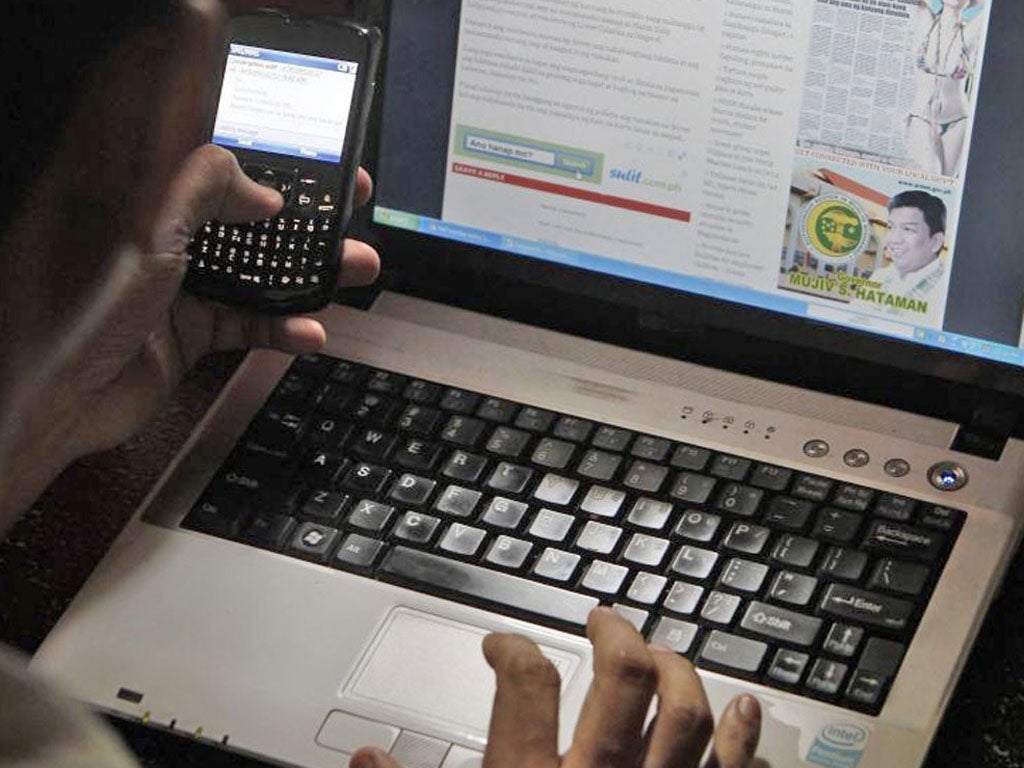Web wired world: a guide to the two-speed online planet
Which country has the best internet access? The worst? And which nation is the most addicted to social networking? A new report reveals all

Your support helps us to tell the story
From reproductive rights to climate change to Big Tech, The Independent is on the ground when the story is developing. Whether it's investigating the financials of Elon Musk's pro-Trump PAC or producing our latest documentary, 'The A Word', which shines a light on the American women fighting for reproductive rights, we know how important it is to parse out the facts from the messaging.
At such a critical moment in US history, we need reporters on the ground. Your donation allows us to keep sending journalists to speak to both sides of the story.
The Independent is trusted by Americans across the entire political spectrum. And unlike many other quality news outlets, we choose not to lock Americans out of our reporting and analysis with paywalls. We believe quality journalism should be available to everyone, paid for by those who can afford it.
Your support makes all the difference.Broadband has been a legal right for citizens of Finland since 2010. But while in most of the developed world access to fast internet is rapidly becoming a fact of life like piped water and electricity, many developing countries struggle to attain the vital connective technologies which will make the difference between their people joining the rest of the world or lagging even further behind. In its new report, The State of Broadband 2012, the Broadband Commission, established by the International Telecommunication Union (ITU) and Unesco, spells out the momentousness of the revolution we are living through.
Click here to see 'Global network: Who's online and who isn't' graphic
"As the price of handsets falls and their functionality increases," the authors write, "soon the vast majority of people on the planet will hold in their hands a device with higher processing power than the most powerful computers from the 1980s."
Since Sir Tim Berners-Lee invented the internet back in the 1980s, the world's richest and smallest countries have acted fast to anchor what the report calls "the circulation system of the knowledge society" in their infrastructure. Today, Switzerland boasts nearly 40 broadband subscriptions per 100 people and Singapore and South Korea have more active mobile broadband subscriptions than people. Meanwhile, in large areas of Africa, South Asia and Latin America, signals are still spotty and devices as rare as gold dust. In Mali, Turkmenistan, Eritrea, Bangladesh and 21 other countries, fewer than one per cent have broadband subscriptions or mobile broadband. And at a time when access to broadband has become critical to economic growth – India, despite having a very patchy network, has created 10 million jobs thanks to the internet – failure by governments to take the right measures could be disastrous, the report says.
Economic liberalisation can hinder the efforts of poor countries to build a reliable network. "Liberalisation and competition have created a fragmented market lacking the economies of scale and the regulatory certainty needed," the report argues. One quick fix for reaching "the third billion" is satellite, which avoids problems caused by inadequate infrastructure on the ground. In such countries, cheap pre-paid broadband access vouchers help spread the internet habit fast.
GLOBAL NETWORK WHO’S ONLINE - AND WHO ISN’T
Around one-third of the world's population can now access the internet, but many countries still have a long way to go before their citizens can get online
US: Beaten by Canada for the number of fixed broadband subscriptions (Canada has 32 per cent, whereas the US has 28.7 – the same as the tiny principality of Andorra). However, the US ranks eighth in the world for mobile broadband subscriptions.
UK: Ranks 15th in the world in terms of internet access, with 82 per cent of the population using the internet in 2011, compared with a global average of 32.5 per cent.
Iceland: Boasts the highest percentage of internet users in the world, with 95 per cent of the population going online in 2011. A world leader in internet usage for years, Iceland has even used online crowdsourcing via social media to help draw up the country’s new constitution.
Niger: Only one per cent of homes in Niger has internet access. The global average, of countries surveyed, was 20.5 per cent
South Korea: 97.2 per cent of South Korean households had access to the internet in 2011. The country also has the world’s second highest number of active mobile broadband subscriptions, below Singapore.
Philippines: Boasts the world’s highest number of social network users, with 75 per cent of active Internet users using one or more services.
East Timor: This tiny nation had the world’s lowest internet usage in 2011 of more than 170 countries surveyed, with only 0.9 per cent of its 1.2m population going online last year
Join our commenting forum
Join thought-provoking conversations, follow other Independent readers and see their replies
Comments